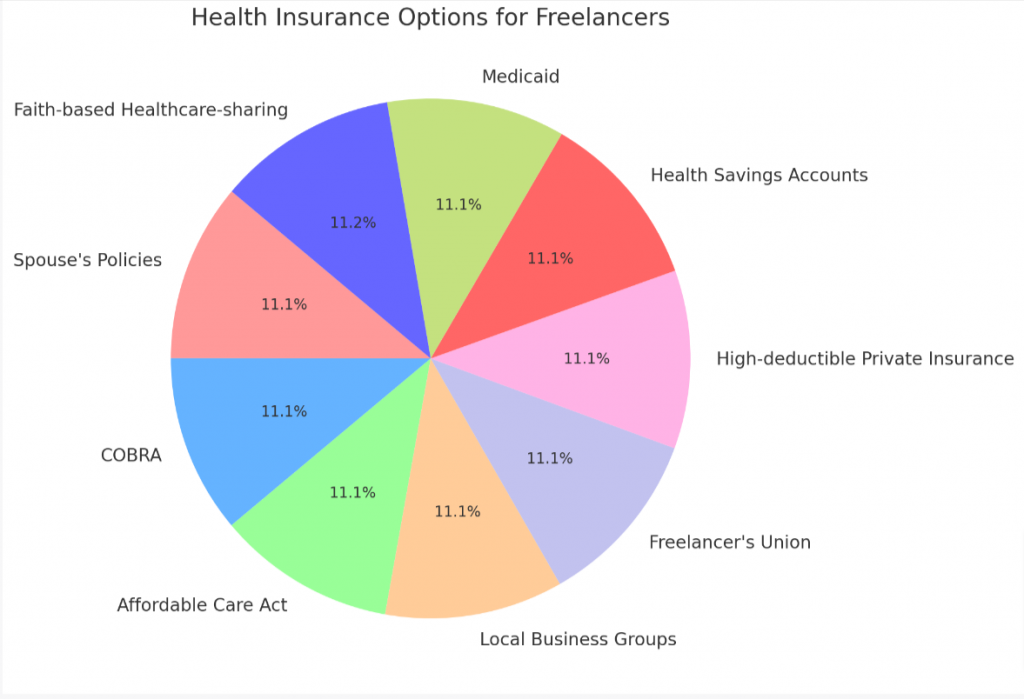Navigating Health Coverage: A Guide to Insurance Options for Freelancers
Freelancing offers many perks, but navigating the health insurance landscape isn’t one of them. With self-employed individuals susceptible to high medical costs, securing a reliable health insurance plan is crucial.
This blog will guide you through various health insurance options tailored for freelancers and help you choose the most suitable coverage for your needs. Ready for a healthier future? Let’s dive in!
Key Takeaways
- Freelancers often need to navigate the health insurance landscape on their own.
- Health insurance is important for freelancers to protect against high medical costs.
- Top health insurance options for freelancers include spouse’s policies, COBRA, the Affordable Care Act, local business groups, the Freelancer’s Union, high-deductible private insurance, Health Savings Accounts, Medicaid, and faith-based healthcare-sharing.
- The average cost of health insurance in the Marketplace is $495 per month.
Understanding Self-Employed Health Insurance
Self-employed health insurance is important for freelancers because it provides them with coverage for medical expenses and helps protect against high healthcare costs.
Who qualifies as self-employed?
In the world of employment, individuals such as freelancers, entrepreneurs, and independent contractors fall under the category of being self-employed. They manage their own business operations without a traditional employer-employee relationship.
This means they are responsible for maintaining their healthcare needs on their own, since they do not have access to employer-sponsored health insurance. Whether you’re a graphic designer taking on clients from around the globe or an artist selling your crafts at local fairs – if you’re directly in control of how work is done without oversight from an employer, you qualify as self-employed!
Why is health insurance important for freelancers?
Health insurance proves vital for freelancers because it shields against the financial hardship of unexpected medical costs. Statistics reveal that an uninsured hospital stay can stack up debts over $10,000 in just one night.
It’s a massive amount that can financially cripple anyone, especially freelancers who typically lack steady income source or emergency funds. Moreover, without health insurance coverage, many freelancers might delay or even skip necessary care due to cost concerns leading to poorer health outcomes.
Health insurance options such as those offered through Health Insurance Marketplace and government-provided Medicare and Medicaid provide a safety net for self-employed individuals, ensuring they receive essential medical services when needed without enduring significant financial strain.
In turn, this allows them to focus on their work without worrying about possible healthcare costs ruining their budgeting plans.
Top Health Insurance Options for Freelancers
Spouse’s policy, COBRA, Affordable Care Act, local business groups, Freelancer’s Union, high-deductible private insurance, Health Savings Accounts, Medicaid, and faith-based healthcare-sharing are among the top health insurance options for freelancers.

Spouse’s policy
A spouse’s policy often offers a cost-effective solution for freelancers seeking health insurance. Most employers extend their healthcare benefits to the spouses of their employees, offering comprehensive coverage at a fraction of the cost compared to individual plans.
Under such policies, freelancers can receive essential medical services alongside preventative care without burning a hole in their wallets. Freelancers from various fields like consulting, real estate, and writing find taking advantage of this option both practical and affordable for their unique working situations.
This also protects them against unforeseen medical debt or healthcare costs that may arise unexpectedly.
COBRA
COBRA serves as one of the several health insurance options for freelancers. It offers the advantage of extending an individual’s coverage from their employer-based group plan, typically for up to 18 months after it would have initially ended.
Freelancers with access to this option can maintain a high level of comprehensive health insurance. However, the embrace of COBRA means bearing full responsibility for payment. Recipients foot the total cost plus a 2% administrative fee, which makes COBRA more expensive than other avenues of acquiring independent contractor health insurance coverage.
While it may seem daunting on your financial well-being, you’ll still receive essential medical services and preventative care under this scheme just like any regular employee would.
Because healthcare costs are unpredictable at times, keeping your access to such benefits might be worth considering despite its price tag! In some cases, you can stretch out your COBRA coverage even further up to 36 months making it an ideal temporary solution while hunting or transitioning into more affordable freelancer health insurance plans.
Affordable Care Act
The Affordable Care Act, also known as Obamacare, has been instrumental in providing health insurance options for self-employed individuals, including freelancers. It offers subsidized coverage through the Health Insurance Marketplace, making it more affordable for low-income individuals and families to obtain comprehensive insurance.
The ACA also expanded Medicaid eligibility, allowing more people with limited incomes to qualify for free or low-cost coverage. This means that self-employed workers who meet the income requirements can take advantage of these programs to secure reliable health insurance coverage without breaking the bank.
Additionally, the ACA ensures that individuals with pre-existing conditions cannot be denied coverage or charged higher premiums based on their medical history.
Local business groups
Local business groups offer group health insurance plans specifically designed for freelancers. These plans are a cost-effective option for independent workers who may not have access to employer-sponsored coverage.
Whether you’re a freelance writer, designer, or consultant, local business groups can provide you with the opportunity to enroll in comprehensive health insurance policies that meet your specific needs.
Through state health insurance exchanges, these groups offer a range of options and benefits tailored to residents in their respective areas. When navigating the complex world of health insurance as a freelancer, agents and brokers associated with local business groups can provide valuable assistance in finding the best plan that fits both your budget and healthcare requirements.
Freelancer’s Union
The Freelancer’s Union is a valuable resource for freelancers looking to understand their health insurance options. They offer guidance and support in navigating the complex world of health insurance, providing information on different plans and coverage options.
Whether you’re looking for affordable private insurance, exploring the option of joining a healthcare-sharing ministry, or considering high-deductible plans with Health Savings Accounts, the Freelancer’s Union can help you find the right fit for your needs.
With their resources and assistance, freelancers can gain access to comprehensive health insurance that protects their financial well-being in case of a medical crisis.
High-deductible private insurance
High-deductible private insurance is a recommended option for freelancers who are self-employed and looking for health insurance coverage. With this type of insurance, individuals pay lower monthly premiums in exchange for higher deductibles.
While the deductible might be high, this type of plan can provide financial protection in case of unexpected medical expenses. It allows freelancers to have control over their healthcare decisions while still having coverage for major illnesses or injuries.
Balancing affordability with appropriate coverage is essential when considering high-deductible private insurance as an option for health insurance as a freelancer.
Health Savings Accounts
Health Savings Accounts (HSAs) are highly recommended as a top health insurance option for freelancers. These accounts allow freelancers to save money specifically for medical expenses while also providing tax advantages.
HSAs are typically associated with comprehensive health insurance plans that offer coverage for essential medical services. One of the major benefits of HSAs is the flexibility and control they provide to freelancers.
The funds in an HSA can be used to pay for qualified medical expenses, such as doctor visits, prescription medications, and hospital stays. With an HSA, freelancers have the ability to manage their healthcare costs more effectively and plan ahead for potential medical needs without relying solely on out-of-pocket payments or traditional insurance coverage.
Medicaid
Medicaid provides free coverage for about 74 million Americans and can be a top health insurance option for freelancers with low incomes. It offers affordable coverage for self-employed individuals who may not be able to afford private insurance.
Medicaid provides comprehensive coverage that can protect freelancers from unexpected medical expenses, helping to cover costs in the event of a medical emergency or while recovering from illness or injury.
Faith-based healthcare-sharing
Faith-based healthcare-sharing is an alternative option for freelancers seeking health insurance coverage. It involves joining a community or organization where members pool their financial resources to help cover each other’s medical expenses.
Instead of paying traditional premiums, participants contribute a fixed monthly amount that goes towards assisting others within the group. These programs often require adherence to specific religious beliefs and values.
While faith-based healthcare-sharing may not provide the same level of comprehensive coverage as traditional health insurance, it offers a cost-effective solution for freelancers who want to support their fellow community members while accessing some form of protection against unexpected medical costs.
Cost of Health Insurance for Freelancers
The average cost of health insurance in the Marketplace is an important consideration for freelancers.
Average cost in the Marketplace
The average cost of health insurance for freelancers in the Marketplace is $495 per month, or $5,940 annually. However, it’s important to note that costs can vary depending on your location.
Some states have higher monthly premiums, reaching over $700, while others have more affordable rates in the range of $300 to $400 per month. Remember that these are just averages and individual costs may be higher or lower based on factors like age, location, and plan type.
For freelancers looking for more affordable options, it’s worth exploring if you qualify for a tax subsidy. This can significantly reduce your monthly premium payments. On average, freelancers who qualify for a tax subsidy pay around $200 per month for health insurance coverage.
Ways to reduce cost with advanced premium tax credit
You can reduce the cost of health insurance as a freelancer by taking advantage of the advanced premium tax credit. Consider these options:
- Apply for the tax credit: Check if you qualify for the advanced premium tax credit through the Health Insurance Marketplace.
- Estimate your income accurately: Make sure to provide an accurate estimate of your income when applying for the credit.
- Adjust your coverage: Find a plan that meets your needs and budget while still qualifying for the tax credit.
- Explore Medicaid eligibility: If your income falls below a certain threshold, you may be eligible for Medicaid, which could significantly reduce your health insurance costs.
- Re-evaluate annually: Remember to review your income and eligibility each year during open enrollment to ensure you continue receiving the tax credit.
Tax Implications for Freelancers
Freelancers may be able to write off their health insurance premiums if they are self-employed, which can help lower their taxes.
Can health insurance be written off if self-employed?
Self-employed individuals have the potential to write off their health insurance premiums as a business expense on their taxes. To be eligible for this deduction, the health insurance plan must be established under the self-employed person’s business.
This deduction can be taken on Schedule C of the individual’s tax return and is not subject to the usual 7.5% adjusted gross income limitation. In fact, if certain requirements are met, self-employed individuals can deduct 100% of their health insurance premiums.
How freelancer health insurance can lower your taxes
Freelancer health insurance can lower your taxes by providing opportunities for tax deductions. As a self-employed individual, you may be able to deduct the premiums you pay for health insurance on your taxes.
This deduction can help reduce your taxable income, ultimately lowering the amount of taxes you owe. By taking advantage of this deduction, freelancers can potentially save money and improve their financial well-being.
Choosing the Right Health Insurance Plan
Compare and find affordable health insurance by considering factors such as coverage, deductibles, premiums, and network providers.
How to compare and find affordable health insurance
Comparing and finding affordable health insurance can be a daunting task for freelancers. However, with the right approach, it is possible to find a plan that meets your needs and budget. Here are some steps you can take to compare and find affordable health insurance:
- Evaluate your healthcare needs: Begin by assessing your healthcare needs and determining what type of coverage you require. Consider factors such as pre-existing conditions, prescription medications, and anticipated medical expenses.
- Research different plans: Take the time to research various health insurance plans available in your area. Look for plans that offer comprehensive coverage at a reasonable cost. Consider both individual plans and group plans offered through professional or trade organizations.
- Compare premiums: Compare the monthly premiums of different health insurance plans. Keep in mind that lower premiums may come with higher deductibles or limited coverage, so weigh the costs against the level of coverage provided.
- Examine out-of-pocket costs: In addition to premiums, consider the potential out-of-pocket costs associated with each plan. This includes deductibles, copayments, and coinsurance amounts. Make sure these costs align with your budget.
- Check provider networks: Look into the provider networks associated with each health insurance plan. Ensure that your preferred doctors, hospitals, and specialists are included in the network to avoid unexpected out-of-network charges.
- Review prescription drug coverage: If you take regular prescription medications, pay attention to each plan’s formulary – the list of covered drugs – and any associated copayments or coinsurance amounts.
- Consider additional benefits: Some health insurance plans may offer additional benefits such as dental or vision coverage that could be beneficial to you. Factor these benefits into your decision-making process.
- Utilize online tools: Take advantage of online tools such as eHealthInsurance.com or Healthcare.gov to compare health insurance plans side by side based on your specific location and requirements.
Considerations when selecting a plan
Choosing the right health insurance plan is an important decision for freelancers. It’s crucial to consider factors such as your budget, medical needs, and preferred healthcare providers.
You should also look into the coverage options available, including essential services like preventative care and hospital stays. Additionally, be sure to assess the deductibles and premiums associated with each plan, as well as any tax credits or subsidies that may help reduce costs.
Taking these considerations into account will ensure you find a plan that meets your needs while protecting your financial well-being during medical crises.
Conclusion
In conclusion, understanding health insurance options is crucial for freelancers to protect themselves from unexpected medical expenses. By exploring options like spouse’s policies, COBRA, the Affordable Care Act, and local business groups, freelancers can find affordable coverage that suits their needs.
It’s important for freelancers to consider factors such as cost, coverage, and tax implications when choosing the right health insurance plan. Taking proactive steps in securing health insurance will contribute to the overall financial well-being of freelancers.

